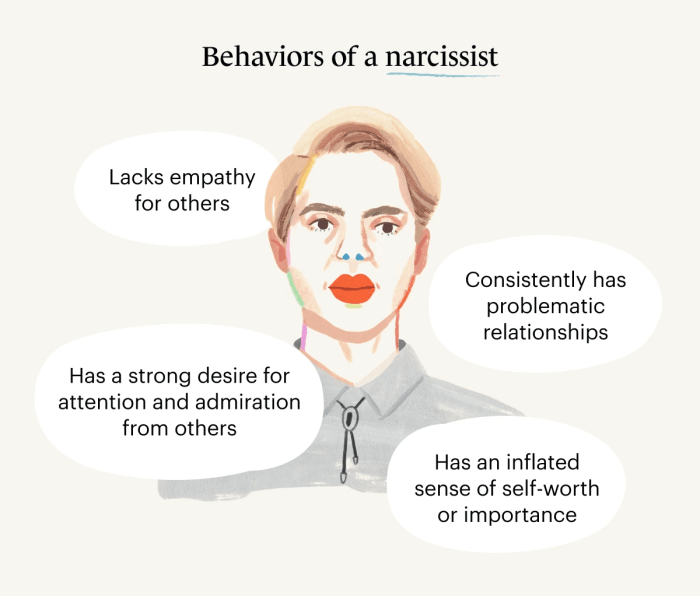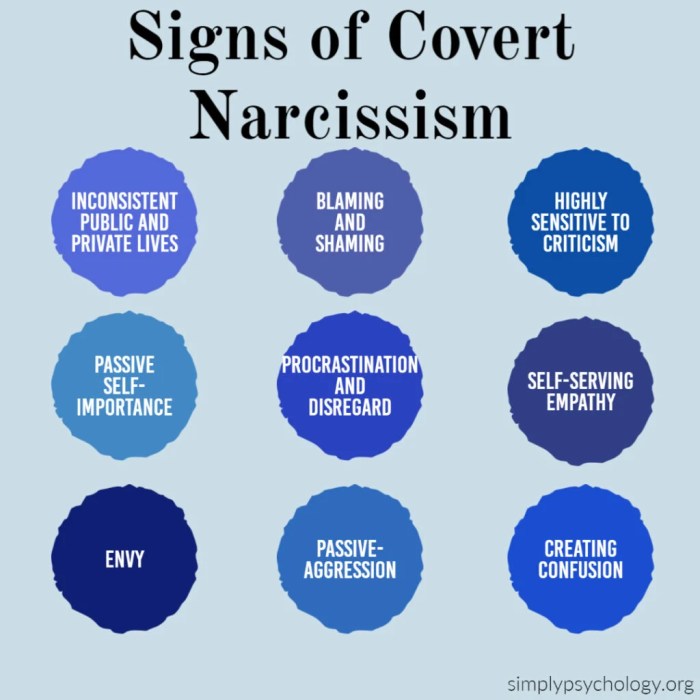How to spot a narcissist health – How to spot a narcissist: It’s a question that’s increasingly on people’s minds as awareness of this personality disorder grows. Narcissists can be incredibly charming at first, but their manipulative behavior can have a devastating impact on your mental and physical well-being.
Understanding the signs of narcissistic personality disorder (NPD) is crucial for protecting yourself from the emotional and psychological damage it can inflict.
This article delves into the key characteristics of NPD, the red flags to watch out for, and the lasting consequences of narcissistic abuse. We’ll explore how to establish healthy boundaries, prioritize self-care, and find the support you need to heal and thrive.
Understanding Narcissistic Personality Disorder

Narcissistic Personality Disorder (NPD) is a mental health condition characterized by an inflated sense of self-importance, a need for admiration, and a lack of empathy for others. Individuals with NPD often exhibit a pattern of grandiose thinking, a sense of entitlement, and a tendency to exploit others.
This disorder can have a significant impact on a person’s health and well-being, affecting their relationships, work, and overall quality of life.
Key Characteristics of NPD

People with NPD typically display a range of characteristic behaviors, including:
- Grandiose sense of self-importance:They often believe they are superior to others and have a strong sense of entitlement.
- Need for admiration:They crave constant praise and attention and are easily offended by criticism.
- Lack of empathy:They struggle to understand or share the feelings of others and may exploit or manipulate others to achieve their own goals.
- Envy of others:They often feel envious of those they perceive as more successful or admired.
- Arrogant and haughty behavior:They may exhibit a condescending or patronizing attitude towards others.
Impact of NPD on Health and Well-being
NPD can have a detrimental impact on a person’s health and well-being in various ways:
- Relationship difficulties:Their manipulative and exploitative behaviors can strain relationships with family, friends, and romantic partners.
- Work problems:Their lack of empathy and tendency to focus on their own needs can hinder their ability to collaborate effectively in a work environment.
- Mental health issues:NPD can be associated with other mental health conditions, such as depression, anxiety, and substance abuse.
- Physical health problems:Stress and anxiety stemming from NPD can contribute to physical health issues like high blood pressure, heart disease, and digestive problems.
Examples of NPD in Relationships
The manipulative and exploitative nature of NPD can manifest in interpersonal relationships in various ways:
- Gaslighting:They may deny or distort reality to make their partner question their own sanity.
- Love bombing:They may shower their partner with excessive attention and affection in the early stages of a relationship, only to withdraw it later.
- Triangulation:They may involve other people in their relationships to create conflict or jealousy.
- Emotional abuse:They may use insults, put-downs, and threats to control and manipulate their partner.
Identifying Red Flags
Recognizing the red flags of narcissistic behavior is crucial for protecting your own well-being. While not everyone who exhibits these traits has NPD, they can be indicative of unhealthy patterns in relationships.
Common Red Flags
Here are some common red flags that may signal narcissistic behavior:
- Exaggerated sense of self-importance:They constantly boast about their achievements and may dismiss or belittle others’ accomplishments.
- Need for constant admiration:They expect to be praised and admired by others and may become upset when they don’t receive the attention they crave.
- Lack of empathy:They struggle to understand or share the feelings of others and may appear indifferent to the needs or suffering of others.
- Sense of entitlement:They believe they deserve special treatment and may demand favors or preferential treatment from others.
- Exploitation of others:They may use others to achieve their own goals without regard for the well-being of those around them.
- Envy of others:They often feel envious of those they perceive as more successful or admired and may try to sabotage others’ achievements.
- Arrogant and haughty behavior:They may exhibit a condescending or patronizing attitude towards others and may look down upon those they consider inferior.
Detrimental Behaviors
Some narcissistic behaviors can be particularly detrimental to one’s health and well-being, including:
- Gaslighting:Manipulating someone into doubting their own sanity or perception of reality.
- Love bombing:Showering someone with excessive attention and affection to control them.
- Triangulation:Involving third parties to create conflict or jealousy in a relationship.
- Emotional abuse:Using insults, put-downs, and threats to control and manipulate someone.
Healthy Self-Confidence vs. Narcissistic Traits
It’s important to distinguish between healthy self-confidence and narcissistic traits. Healthy self-confidence involves a realistic view of one’s strengths and weaknesses, while narcissism is characterized by an inflated and unrealistic sense of self-importance. A healthy sense of self-worth doesn’t require constant validation from others, while narcissists crave admiration and attention.
The Impact of Narcissistic Abuse
Narcissistic abuse can have a profound impact on a person’s emotional, mental, and physical health. The constant manipulation, gaslighting, and emotional abuse can leave victims feeling confused, isolated, and deeply hurt.
Emotional, Mental, and Physical Consequences

Narcissistic abuse can lead to a range of negative consequences, including:
- Stress and anxiety:The constant uncertainty and manipulation can cause significant stress and anxiety.
- Depression:The emotional toll of narcissistic abuse can lead to feelings of hopelessness, worthlessness, and depression.
- Post-traumatic stress disorder (PTSD):Some victims may develop PTSD as a result of the trauma they have experienced.
- Low self-esteem:The constant criticism and devaluation from a narcissist can erode a person’s self-esteem and confidence.
- Physical health problems:Stress and anxiety stemming from narcissistic abuse can contribute to physical health issues like high blood pressure, heart disease, and digestive problems.
Long-Term Effects
The long-term effects of narcissistic abuse can be significant. Victims may struggle with trust issues, relationship difficulties, and difficulty setting boundaries. They may also experience ongoing emotional distress and difficulty recovering from the trauma they have endured.
Seeking Help and Support
If you suspect you are dealing with a narcissist, it’s essential to seek help and support. There are resources available to help you understand the situation, cope with the emotional impact, and develop strategies for moving forward.
Resources for Victims of Narcissistic Abuse
| Resource | Description |
|---|---|
| Therapy | Individual therapy can provide a safe space to process your experiences, develop coping mechanisms, and build resilience. |
| Support Groups | Connecting with others who have experienced narcissistic abuse can provide validation, support, and a sense of community. |
| Helplines | Confidential helplines offer emotional support, information, and resources for victims of abuse. |
Steps to Protect Your Health
Here are some steps you can take to protect your mental and physical health if you suspect you are dealing with a narcissist:
- Educate yourself:Learn about narcissistic personality disorder and the dynamics of narcissistic abuse.
- Set boundaries:Establish clear boundaries with the narcissist and enforce them consistently.
- Limit contact:Reduce your contact with the narcissist as much as possible.
- Seek support:Talk to trusted friends, family members, or a therapist about your experiences.
- Prioritize self-care:Engage in activities that promote your well-being, such as exercise, relaxation techniques, and hobbies.
Types of Therapy, How to spot a narcissist health
Several types of therapy can be helpful in healing from narcissistic abuse, including:
- Cognitive Behavioral Therapy (CBT):Helps identify and challenge negative thought patterns and develop healthier coping mechanisms.
- Dialectical Behavior Therapy (DBT):Teaches skills for managing emotions, improving relationships, and reducing self-harm behaviors.
- Trauma-Focused Therapy:Addresses the trauma of narcissistic abuse and helps develop strategies for coping with the emotional impact.
Healthy Boundaries and Self-Care
Establishing and maintaining healthy boundaries with narcissists is crucial for protecting your well-being. It’s also essential to prioritize self-care and build resilience in the face of narcissistic behavior.
Importance of Healthy Boundaries
Healthy boundaries are essential for protecting yourself from the manipulative and exploitative behaviors of narcissists. They help you maintain your sense of self, protect your emotional well-being, and prevent the narcissist from controlling your life.
Strategies for Self-Care and Resilience
Here are some strategies for prioritizing self-care and building resilience:
- Engage in activities you enjoy:Spend time doing things that bring you joy and help you relax.
- Practice mindfulness:Focus on the present moment and cultivate a sense of awareness and acceptance.
- Exercise regularly:Physical activity can help reduce stress, improve mood, and boost your energy levels.
- Get enough sleep:Aim for 7-8 hours of sleep each night to support your physical and mental health.
- Eat a healthy diet:Nourish your body with nutritious foods to fuel your energy and support your overall well-being.
- Connect with supportive people:Spend time with friends and family who provide you with love, understanding, and encouragement.
Self-Compassion and Self-Acceptance
Practicing self-compassion and self-acceptance is essential for healing from narcissistic abuse. Be kind to yourself and acknowledge that you are worthy of love and respect. Remember that you are not to blame for the narcissist’s behavior.
Closing Summary: How To Spot A Narcissist Health
Navigating the world of narcissism can be challenging, but by arming yourself with knowledge and understanding, you can protect your health and well-being. Remember, recognizing the signs of NPD, setting firm boundaries, and seeking support are essential steps towards healing and reclaiming your life.
It’s time to take charge and create a healthier, happier future for yourself.
Frequently Asked Questions
What are some subtle signs of narcissism?
Subtle signs can include excessive bragging, a need for constant admiration, an inability to apologize, and a tendency to belittle others. They might also display a lack of empathy, disregard for others’ feelings, and a sense of entitlement.
Can I help a narcissist?
While you can’t change a narcissist, you can protect yourself from their harmful behavior. Focus on establishing healthy boundaries and seeking support for your own well-being. Professional help can be invaluable in navigating this complex situation.
How can I break free from a narcissist?
Breaking free requires setting clear boundaries, minimizing contact, and seeking support from trusted friends, family, or therapists. It’s a process that requires courage and self-care. Remember, you deserve to be treated with respect and dignity.